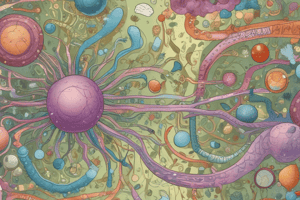Podcast
Questions and Answers
What role do pyrogens play in the body's response to infection?
What role do pyrogens play in the body's response to infection?
- They act on the hypothalamus to raise body temperature. (correct)
- They regulate blood pressure during fever.
- They directly kill invading microorganisms.
- They enhance the production of red blood cells.
Which statement accurately describes the adaptive immune system?
Which statement accurately describes the adaptive immune system?
- It amplifies the response of leukocytes independently of an antigen.
- It is unable to remember past infections.
- It operates primarily through nonspecific defense mechanisms.
- It requires prior exposure to specific antigens for activation. (correct)
One of the benefits of a moderate fever includes which of the following?
One of the benefits of a moderate fever includes which of the following?
- Increases the number of circulating leukocytes.
- Promotes the extermination of all cell types.
- Directly generates antibodies against pathogens.
- Sequesters iron and zinc to inhibit microbial growth. (correct)
Which component of the immune system is primarily responsible for activating the complement system?
Which component of the immune system is primarily responsible for activating the complement system?
What are the key characteristics of the adaptive immune system?
What are the key characteristics of the adaptive immune system?
Which pathway is activated spontaneously without the need for any antibodies or sugar binding?
Which pathway is activated spontaneously without the need for any antibodies or sugar binding?
What is the primary role of C3b in the complement system?
What is the primary role of C3b in the complement system?
Which complement component is responsible for enhancing inflammation by attracting phagocytes?
Which complement component is responsible for enhancing inflammation by attracting phagocytes?
Which complement proteins form the Membrane Attack Complex (MAC) that lyses target cells?
Which complement proteins form the Membrane Attack Complex (MAC) that lyses target cells?
Which of the following statements about the pathways of complement activation is correct?
Which of the following statements about the pathways of complement activation is correct?
Flashcards are hidden until you start studying
Study Notes
Complement System
- Three complement activation pathways: Classical (by antibodies), Lectin (by lectins), and Alternative (spontaneous activation due to lack of inhibitors).
- C3 protein is central, leading to formation of C3a and C3b.
- Opsonization occurs when C3b coats pathogens, enhancing phagocytosis.
- C5b initiates the formation of the Membrane Attack Complex (MAC) which lyses target cells.
- C5a enhances inflammation by stimulating histamine release and attracting phagocytes.
Fever
- Fever is characterized by abnormally high body temperature as a response to invading microorganisms.
- Leukocytes release pyrogens that act on the hypothalamus to elevate body temperature.
- Moderate fever benefits the body by sequestering iron and zinc, hindering microorganism growth, and increasing metabolic rate for faster repair.
Adaptive Defenses
- The adaptive immune system protects against infections and abnormal cells, amplifies inflammation, and activates the complement system.
- Requires prior exposure to specific foreign substances to become effective.
- Characteristics include specificity, systemic nature, and memory for rapid response to known antigens.
Humoral and Cellular Immunity
- Humoral Immunity: Involves antibodies that bind to pathogens, marking them for destruction; targets extracellular pathogens.
- Cellular Immunity: Involves lymphocytes that attack infected cells directly or indirectly; targets intracellular pathogens.
Antigens
- Antigens provoke an immune response and mobilize adaptive defenses; most are large, complex, and foreign molecules.
- Complete antigens have immunogenicity (stimulate lymphocyte proliferation) and reactivity (interact with lymphocytes and antibodies).
Haptens
- Small molecules that are not immunogenic by themselves but can trigger an immune response when combined with body proteins.
- Examples include poison ivy and cosmetics.
Antigenic Determinants
- Only specific parts of antigens, known as antigenic determinants, are recognized by antibodies and lymphocyte receptors.
- Natural antigens have various determinants, eliciting responses from multiple lymphocyte populations.
Self-Antigens and MHC Proteins
- Self-antigens, such as MHC proteins, are non-antigenic to the individual but can provoke an immune response in others during transfusions or grafts.
- MHC proteins present antigens to T lymphocytes, crucial for immune recognition.
Cells of the Adaptive Immune System
- Two main types of lymphocytes: B lymphocytes (humoral immunity) and T lymphocytes (cellular immunity).
- Antigen-presenting cells (APCs) assist in initiating immune responses without directly responding to specific antigens.
Lymphocyte Development and Activation
- Lymphocytes originate in red bone marrow and undergo maturation before circulating through secondary lymphoid organs.
- Activation involves antigen encounter, leading to proliferation and differentiation into effector (plasma) cells and memory B cells for future responses.
Studying That Suits You
Use AI to generate personalized quizzes and flashcards to suit your learning preferences.




